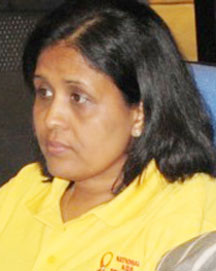-nearly 3,000 on national HIV treatment programme
Guyana has acquired a supply of anti-retroviral drugs (ARVs) to treat persons on the national treatment programme for more than a year, according to Director of National AIDS Programme Secretariat (NAPS) Dr. Shanti Singh.
The supply arrived here close to two weeks ago, shortly after the ARV supply in the country had depleted. Singh has assured that the current stock is likely to last until the end of 2011. Funding from the Global Fund supplies is also expected for the next three years.
Figures recently released from NAPS disclosed that at the end of June 2010,

there were 2,966 patients on ARVs, some of whom were affected when the supply went dry here. A few persons on the national programme had complained about the manner in which the ARV depletion was handled, in addition to raising concerns about being supplied with one of the two drugs used in the combination therapy. Singh recently met with a delegation from the National AIDS Committee (NAC) to address concerns on HIV/AIDS-related matters, including the issue of an adequate drug supply in the country. NAC said that a crisis was averted at the beginning of September when emergency action to obtain one of the main ARVs proved successful; the drug Efavirenz.
NAC has reported that during the meeting last Thursday, priority was given to understanding the recent shortage of ARVs at the National Care & Treatment Centre. Singh told the delegation that NAPS deals with the technical-clinical issues with respect to ARVs. She noted that from meetings held since early June between NAPS and the technical team responsible for procurement within the MOH, adequate stocks of drugs were in place at the time and orders had been placed for additional supplies. However, instead of five sets of drugs on order, the shipment only saw the arrival of two types. NAC questioned Singh as to whether any adverse effects can occur if patient treatment on the combination drug regime is interrupted, and was informed that there is no danger since the interruption only lasted for ten days. It said too that reference was also made to structured periods when patients can withdraw from treatment – structured interrupted treatment (SIT).
The NAC said that it raised concern on staffing at the National Care & Treatment Centre, following the resignation of two senior Guyanese doctors, including the Director of the Centre, and was assured that there are three trained doctors currently at the Centre, and a team of some eleven doctors have been trained for the Regions. This team would also assist in the re-placement of UN Volunteer (UNV) doctors.
The length of service and duration of stay at interior hospitals of trained HIV/AIDS doctors was also briefly discussed. Additionally, NAC said that the issue was again raised of a special training seminar on HIV prevention, treatment and care for Cuban doctors currently serving in Guyana and the new batches of qualified Guyanese medical practitioners from Cuba.
The NAC has promised to follow up this issue, also with the Minister within the Ministry of Public Service, Dr. Jennifer Westford, and the Minister within the Ministry of Health, Dr. Bheri Ramsarran.
“With respect to adequate stocks of condoms, the NAC was informed that NAPS alone was responsible for distributing approximately 3 million pieces of male and female condoms during 2009,” the NAC said, noting that follow-up reports are to be received, including 2010 breakdown figures and projections.
Further, a discussion also took place on the increase of dengue fever both on the coast and interior and the risk of co-infection. NAC said that given the paucity of data in Guyana and the Caribbean, and in keeping with CARECs advisory, all clinicians should document any history of dengue infection among HIV-infected patients, as well as observe “unusual or unexplained clinical manifestations or adverse effects of medications used to treat HIV and HIV-related conditions among persons co-infected with HIV and dengue”.
The delegation said that it shared copies with the Singh of relevant case studies (Brazil & Singapore), information received from the local East Coast Clean-Up Committee and alerted her of the NAC intention of adapting such information for use in its constituency.
Additionally, the NAC delegation pointed to some issues raised in the NAC Preliminary Comments to Final Draft UNGASS Report (2009) submitted in March 2010 were briefly discussed and flagged for follow-up: namely better protection against sexual violence (especially against women), the constituency and mandate of the Presidential Commission on HIV/AIDS, the composition of the Preparation Team and review process of UNGASS country reports and copies of the National Funding Matrix.





